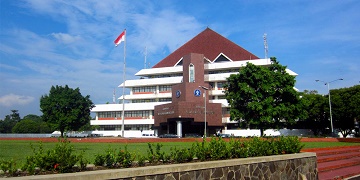Professor of IPB: Needed Accurate Data and Real Time for Food Security

In the commemoration of the world Food Day, celebrated every 16 October, three Professors of Bogor Agricultural University (IPB) contributed their thoughts by holding a joint press conference in Campus of IPB Baranangsiang, Bogor, Sunday (16/10). One of the Professors who explained his thinking was Prof. Dr. Yonny Koesmaryono.
Prof. Yonny explained the importance of the accurate data and the real time for the food security in the face of the climate change phenomena. The climate change had been real that we felt ourselves with increasingly frequent floods and landslides, as well as long droughts. The food production system changed too. The anticipation was by conducting the mitigation measures for reducing the concentration of the greenhouse gases and various adaptation efforts.
The “food defend", one of the new approach concepts which was more than the "food security", where we should do the "food defend " that our food was not only enough but also safe and accessible as needed. Did not let us be invaded by the food supply from outside (import) which could result in our food production system shaky, he said.
Indeed, there was still a difference of opinion or a scientific debate about the occurrence of the phenomenon of the climate change. But in reality, we were experiencing the extreme weather conditions such as floods and droughts which were becoming more frequent. “This condition certainly will hamper the efforts to increase the productivity and the land production, as well as the crops or the livestock,” he added.
According to him, Indonesia should be able to get out of the trap of the rice consumption. Morning, noon and night ate rice. If you could get out of this trap (by utilizing the local food), so the food security did not depend on the productivity of rice (which was often disrupted by the floods and the droughts triggered by the climate change).
Some researches also reported that it happened the impact of the following climate change, such as the increase of the attack of pest and plant diseases and the diseases in the farm animals. However, until now there was not provided the accurate data and the real time (the data collection could be at any moment) on the productivity and the food production with the climate change, especially in the disaster prone areas of climate.
“We need the data that we continuously record. Therefore, we can download these data easily. How much land planted in one growing season. How many types of varieties grown. How extensive is the attack of pest and plant diseases? The scarcity of data like this results in the incompatibility in the analysis of the climate data. So in general the data are important. The implication can be widely included in the import policy or whether or not we are currently facing the Eids or the disaster. What happens now, the statistical analysis data are not out yet, and to be resolved that we should be imported. When the Eids also should be imported. This is because the supply of data cannot be in the real time and reliable,” he said.(zul)



